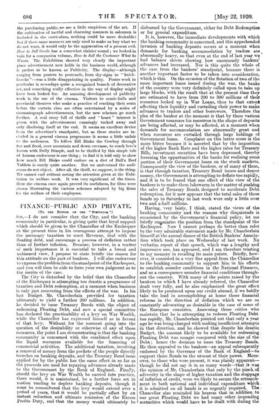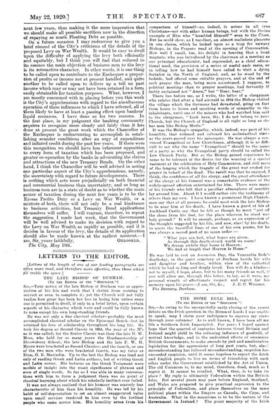FINANCE—PUBLIC AND PRIVATE.
[To- Emma - or Pas " SProrecos."1
SIR,—I do not consider that the City, and the banking community in particular, is giving quite that loyal support which should- be given-to the Chancellor- of the Exchequer at the present time in his courageous attempt to impose the necessary taxation to meet Revenue, deal with the floating debt, and encourage a process of deflation rather than of further inflation., Because; however, in. a matter- of such importance it is, essential to take a broad- and unbiassed view, I propose to state briefly the reason for- this attitude, on the part of bankers. I will also -endeavour to express theproblem from the standpoint of the Exchequer, and- you will their be able to form. your own judgment as to the, merits of the case.
. The City is disturbed by- the belief that the Chancellor of the Exchequer is attempting too drastic a programme of taxation and Debt redemption, at a moment when business. is only just recovering front-thee effects of the. war. In his last Budget. Mr. Chamberlain provided for taxation ultimately to, yield a further 200 millions. In addition, he- decided to issue Treasury Bonds with the object of redeeming Floating Debt, and now a special committee has dechtrecl the practicability of a levy -on War Wealth, while the Chancellor has expressed himself as in favour: of that. levy. Without. for the moment going into the question of the desirability or otherwise of any- of these measures, the point I am-demonstrating is that ,the banking community is concerned, with the combined effect upon the liquid resources available for the financing of commercial activities, The additional taxation, involving- a removal of money from the pockets of the. people directly trenches on banking deposits, and the Treasury Bond,issue applied for by the public has the- samm effect in so fax as the proceeds are used for repaying advances already made to the Government by the. Bank of England.. Finally, should the levy- on- War Wealth be carried into practice, there would, it is. maintained, be a further force set in motion tending to deplete banking. deposits, though it must be remembered that the levy would extend over a period of years, that it would be partially o.ffset by an instant reduction and ultimate remission of the Excess Profits Duty, and that the money would ultimately be disbursed by -the Government, either for Debt Redemption or for general expenditure. It is, however, the immediate developments with -which the banking- community is concerned, and this apprehended invasion. of banking deposits occurs at a moment when demands for banking accommodation by traders . are abnormally heavy, so that even at the end of last year we had balance sheets showing how enormously bankers' advances had increased. Nor is this quite the whole of the case from the bankers' standpoint, because there is important mportant factor to be-taken into consideration, which is this. On the occasion of the flotation of two of the more important loans issued during the war, the banks of the country were. very definitely called upon to take up large blocks, with the result that at the present time they are estimated to have from 200 to 300' millions of their resources. locked- up in War_ Loans, thus to. that extent affecting their liquidity and curtailing their power to make advances to traders and, other borrowers.. Therefore- the plea of the banker at the moment is that by these various. Government measures his resources-inthe shape of deposits. are being affected, or may be affected, at a moment when demands- for accommodation are abnormally great - and when resources - are, curtailed.- through large holdings of Government leans. Complaint on thie.latter score- ie the more bitter because it is asserted that by the imposition, of the. higher Bank.Rate and the higher rates for Treasury Bills, investment seeurities have. been depressed, thereby. lessening the. opportunities of the banks. for realising some, portion of their Government, loans on_ the stock markets., Consequently the view of the bankers, or of many of them,. is that through taxation, Treasury Bond issues and dearer money, the-Government is attempting to deflate too.rapidly,, and it is -to be feared that . one effect of this view of the, bankers is to make them lukewarm in the matter of pushing, the sales of Treasury Bonds. designed to accelerate Debt, redemption, for it now appears that the total sales of these- bonds up to Saturday in last week were only a little over two. and a-half millions: Haying,, very fairly,: I think, stated- the- views of the. banking community. and the reasons why disquietude is occasioned by the Government's financial policy, let me briefly- suwinariee the. position from the. standpoint of the Exchequer. Now I cannot perhaps do better than refer. to. the very admirable statement made by Mr. Chamberlain himself at the annual dinner of the British Bankers' As,sociae tion which took place on Wednesday of last week. No verbatim report of that speech, which was a .lengthy. and impressive one, has appeared, and I am therefore trusting to my memory in recalling its, main points. Briefly„ how- ever, it consistectin, a very fine appeal from the Chancellor to: the banking. community to support him in his efforts to establish sounder conditions in the National Finances, and as a consequence sounder financial conditions through- out the country. With many of the points raised by the bankers to which I have already referred, the Chancellor dealt very- fully, and he also emphasized the-great effect likely to be-produced upon our credit abroad, if we boldly take the lead in accomplishing at home those financial reforms in the direction of deflation which we are, so constantly -advocating as desirable in the case of some of the European countries. Answering those- critics who maintain that he is. attempting to redeem Floating Debt too rapidly, Mr. Chamberlain-pointed out that only a year ago-he was being charged, with making insufficient attempts, in that direction, and he; showed that despite his drastie. Budget, the amount likely to be available for redeeming: Floating Debt was meagre compared with: the size of the Debt; hence the decision- to issue the Treasury. Bonds. lie-then appealed to the bankers—an appeal. eubsequently endorsed by the Governor • of- the Bank of England—to' support, those Bonds-to the utmost of their. powee. More over, to those who -were-present, it was-plainly- apparent-- though lie did. not say it in so many words—that it was. the opinion of Mr. Chamberlain that only by thepinch. of adversity in the shape of. higher taxation and the. stoppage of inflation of credit,. were. we likely to -secure the„retrencia- meat in both national and individual expenditurst it is admitted on all hands is so urgently required... The Chancellor also reminded his hearers that in.addition to our great Floating, Debt we had many, other impending maturities which Would have to be dealt with during the next few years, thus making it the more imperative that we should make all possible sacrifices now in. the direction of repaying as much Floating Debt as possible. On a future oocasion I may endeavour to give you a brief résumé of the City's criticisms of the details of the proposed Levy on War Wealth. It would be easy to dwell upon the difficulty of applying the levy both efficiently and equitably, but I think you will find that reduced to its essence the main objection of business men to the levy is its retroactive character. In other words, it is one thing to be called upon to contribute to the Exchequer a propor- tion of profits or income not at present handled, and quite another to be called upon to deliver up a toll on past income which may or may not have been retained in a form easily obtainable for taxation purposes. What, however, I am mostly concerned with in placing before you this week is the City's apprehensions with regard to the' simultaneous operation of these influences to which I have referred, all of them likely to have at least •a passing effect upon 'bankers' liquid resources. I have done so for two reasons. In the first place, in my judgment the banking community requires to recognize more clearly and fairly than it has done at present the great work which the Chancellor of the Exchequer is endeavouring to accomplish in estab- lishing sounder conditions after an orgy of expenditure and inflated credit during the past few years. If there were this recognition we should have less 'vehement opposition to every form of taxation which has been proposed, and greater co-operation by the banks in advocating the claims and attractions of the new Treasury Bonds. 'On the other hand, I think the Chancellor will be well advised in noting one particular aspect of the City's apprehensions, namely, the uncertainty with regard to future developments. There is nothing which acts more prejudicially on both financial and commercial business than uncertainty, and so long as business men are in a state of doubt as to whether the main source of taxation during the next few years is to be the Excess Profits Duty or a Levy on War Wealth, or a mixture of both, there will not only be a real hindrance to business activities, but Treasury Bond. applications themselves will suffer. I will venture, therefore, to repeat the suggestion I made last week, that the Government will be well advised to make its decision with regard to the Levy on War Wealth as rapidly as possible, and if it decides in favour of the levy, the details of its application should also be made known at the earliest moment.—I



































 Previous page
Previous page